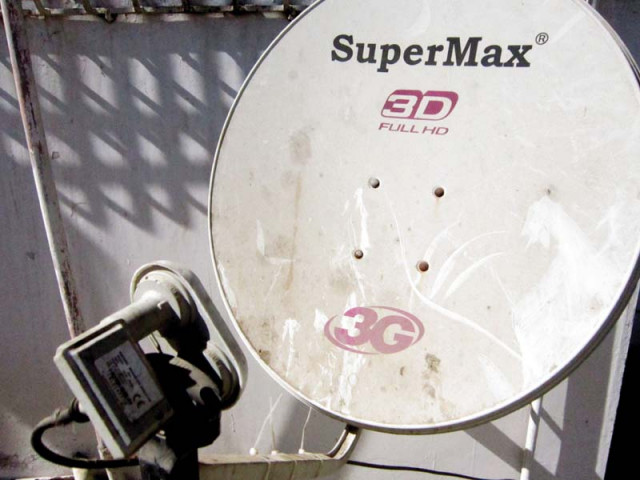Pakistan looks to check Indian DTH service
PEMRA irked by illegal dish antennas, to auction three DTH licences on Dec 7

Pakistani dealers, working on behalf of Indian DTH companies, are smuggling DTH dish and set-top box from Dubai. PHOTO: ATHAR KHAN/EXPRESS
After an endlessly tiring day, Fareeha Khan looks forward to unwinding at home. In the few hours she gets to relax, television seems like the most obvious choice for entertainment.
“I like reality TV shows,” she says. “But then there are a lot of Indian movie channels. So I entertain myself with bits of different flicks between switching channels.”
Illegal cable broadcasts: PEMRA destroys confiscated equipment
To be precise, she has a choice from over 400 TV channels – all of them being broadcast from India through illegal Direct-to-Home or DTH service. Most of them show Hindi-language content.
The last few years have seen a proliferation of such DTH services in Pakistan despite tense ties and absence of any contract to the effect between Islamabad and New Delhi.
DTH services of Indian companies like Dish TV, Reliance Sundirect, SDN, Tata Sky and Videocon are sold through local agents who thrive working under the radar.
Unlike the analogue cable connections, DTH service is a digital platform that relays channels directly to homes from satellite through small dish antennas.
Pakistan imports illegal Dish TV from India but refuses to rid itself of ancient cable operators?
The service is more reliable and lets users view high-definition video. The quality of channels listed at the end on the bandwidth does not deteriorate like those on cable.
Estimates of DTH users range from 70,000 to 2.5 million with most of them concentrated in Lahore, Islamabad and Karachi.
The actual penetration is said to be much more since cable operators also rely on DTHs to show channels like Star Sports, Star Movies and National Geographic, which have not yet received the nod from Pakistan Electronic Media Regulatory Authority (Pemra).
Now that Pemra is awarding DTH licences to Pakistani investors soon, there is an urgency to curb the use of illegal DTH service.
Pemra cracks down on media outlets' coverage of militants
“We have raided, seized and destroyed 2,500 DTH equipment in Islamabad and Lahore,” said Fakharuddin Mughal, Pemra’s spokesman. “We are doing all we can to stop the illegal use.”
But the action is targeted against cable operators. Pemra can’t do much when it comes to DTH systems installed in homes like that of Fareeha’s.
“That’s where (Pakistan) Customs intelligence, FIA and other agencies have a role to play,” said Mughal.
Pakistani dealers, working on behalf of Indian DTH companies, are smuggling DTH dish and set-top box from Dubai, which involves a one-time cost of around Rs10,000 the customer pays.
Since dealers don’t have a registered office, they market through websites. Customers are asked to pay a monthly subscription fee of Rs1,200 via a mobile phone payment service or transfer the amount to an individual’s bank account.
Pemra bans 'immoral' condom advertisement
But the astonishing part of the business is how payments are made to Tata Sky, Reliance, Dish TV and others in India. “That money is being moved illegally. There is no record, no detection,” said an exchange company official.
Pemra’s Director General Licensing Wakeel Khan said around $140 million (around Rs14.7 billion) was being siphoned off by Indian DTHs every year from Pakistan.
“Ultimately, this revenue will trickle down to domestic DTH service providers who win the licence next month.”
Debate on DTH’s future
Pemra is set to auction three DTH licenses on December 7. Ten investors have submitted their documents, which are being vetted.
But at least one prospective operator, business tycoon Aqeel Karim Dhedhi, has opted out of the race. “I am working on something else,” he said.
Absar Alam appointed as Pemra chairman
“I am not saying it’s a bad investment but those who operate in the grey area would have an advantage over DTH licensee. Investors with really deep pockets would venture into it.”
People close to him say his decision was guided by fear that the market is already cluttered and return on investment would be slow in coming.
However, Pemra sees the situation differently. “We should have done this six years ago. Nevertheless, it’s going to be game changer for the media industry,” said a Pemra official.
Pemra’s optimism is based on the premise that DTH lets local media houses earn subscription fee from users in addition to advertisement revenue, which currently makes up for bulk of their topline. And then this would in turn encourage development of quality content.
“Just go back a few years … Star Plus’ soaps were popular with very high TRPs. Then gradually Pakistani dramas took over them. That’s the kind of episode we expect to replay,” said the Pemra official.
Pemra cracks down on media outlets' coverage of militants
Pemra is also preparing for backlash from viewers used to watching a much wider variety of channels.
At the moment only 19 foreign channels have landing rights in Pakistan. These include the likes of CNN, HBO, Ten Sports and AXN. So these are the only options for viewers besides the 86 Pakistani satellite channels.
The regulator is now in talks with some leading international television broadcasters. Pemra’s DG Licensing Wakeel Khan said rules have also been relaxed, making it easier for companies to have landing rights for more channels.
DTH service will also offer thematic channels, which are basically on-demand premium content including movies, dramas and entertainment shows.
“In the end, it’s the Pakistani DTH service providers who have to compete with illegal DTHs. A substantial part of their operational cost will go towards marketing. I am looking at an investment of between $100 million to $150 million in next few years,” Khan said.
Some people argue that DTH won’t change the existing media landscape. “How many households can afford to pay Rs12,000 for a dish antenna? How many of them will be willing to pay Rs1,000 a month for the service? These questions have no clear answers at the moment,” said an industry official.
But beyond this debate, there is another stakeholder with fate closely linked with Pakistan’s DTH initiative.
Television actor Naveed Raza said he would welcome any step that promotes Pakistani entertainment industry.
“I am not at all against Indian content being aired here. But we need to feed ourselves first. It’s an unfair competition. They have both – the big stars and other artists who charge much less than us.”
the writer is a staff correspondent
Published in The Express Tribune, November 30th, 2015.
Like Business on Facebook, follow @TribuneBiz on Twitter to stay informed and join in the conversation.



















COMMENTS
Comments are moderated and generally will be posted if they are on-topic and not abusive.
For more information, please see our Comments FAQ